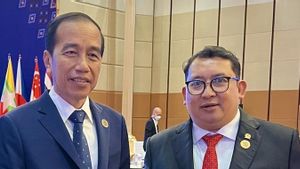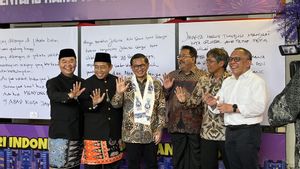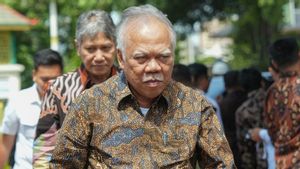JAKARTA President Suharto has never rejected the role of Indonesian migrant workers. Female workers (TKW), especially. Migrant work is considered as one of the most important sources of state revenue. Domestic work is carried out as ammunition for national development.
This fact makes the New Order (Orba) rulers pay serious attention to migrant workers. In approaching Eid, for example. Suharto asked migrant workers not to go home often. The appeal is so that their hard work does not only run out for travel expenses.
Economic growth in the era of President Soeharto and New Order was quite rapid. The Indonesian government made many breakthroughs to make this happen. Efforts to provide full support to migrant workers, one of them.
Even though this support also stripped the government of inability to provide abundant jobs. Those who do not get decent jobs and low education qualifications are supported to become migrant workers outside the country.
This effort is able to overcome the problem of the lack of human resources in sectors that people in migrant workers are not enjoying. From Malaysia, Hong Kong, Korea, to Saudi Arabia.
The domestic work sector, for example. Household Workers (PRT) and plantation workers. The work is increasingly in demand by Indonesian workers because the wages received are exciting. Mainly, because the work does not require special qualifications such as higher education to work.
The New Order also did not close its eyes with the achievements of migrant workers. The owner of power goes down to make regulations that make it easier for migrant workers to work abroad. This is because migrant workers are recognized by the New Order as one of Indonesia's 'donatur' development. Moreover, migrant workers can bring money into the country in large quantities. This fact makes migrant workers often dubbed as heroes of the country's foreign exchange.
The economic role of migrant workers for the first time was publicly recognized when the New Order Government absorbed Repelita IV (1984-1989), which continued to Repelita V, during the New Order government.
As a result, the migrant work sector has become one of the most important sources of state revenue in the state budget until now. The government considers migrant work as part of economic development," said Sulistiowati Irianto in the book Access to Justice and Migration Global (2011).
The New Order considers many positive sides of the presence of migrant workers. The sending of workers abroad is considered capable of solving the problem of unemployment in Indonesia. Adding to the country's foreign exchange as well. President Soeharto understands this very well.
He often learns the fate of migrant workers. Suharto even knows how the desire of migrant workers to immediately gather with a high family. The temptation of returning home became high. Mainly, on Eid al-Fitr.
Most migrant workers will perpetuate the tradition of Eid homecoming. However, Suharto actually appealed to migrant workers not to often go home for Lebaran. Alias, going home is okay, but don't get used to it.
It is true that the desire to meet relatives is important. However, Suharto regretted that their hard work was spent just to pay for homecoming trips. Suharto also suggested that migrant workers and transmigrants (island workers) take advantage of other means of communication to relieve longing.
Either through the post or using the existing telecommunications route. Therefore, their income during work can be sent optimally to the family. The benefits can also be greater, rather than having to spend large funds that are only for trips home.
President Suharto hopes that transmigrants and workers who work outside his hometown do not often return home, so that their hard work does not run out to finance the trip.
To release homesickness for relatives, transmigrants and workers should make maximum use of postal and telecommunication facilities. This hope was conveyed by the Head of State through the Governor of Bengkulu, Surapto, who met him at the Merdeka Palace this morning, July 28, 1984," written in the book Steps of Mr. Harto: March 16, 1983-11 March 1988 (1992).
The English, Chinese, Japanese, Arabic, and French versions are automatically generated by the AI. So there may still be inaccuracies in translating, please always see Indonesian as our main language. (system supported by DigitalSiber.id)










